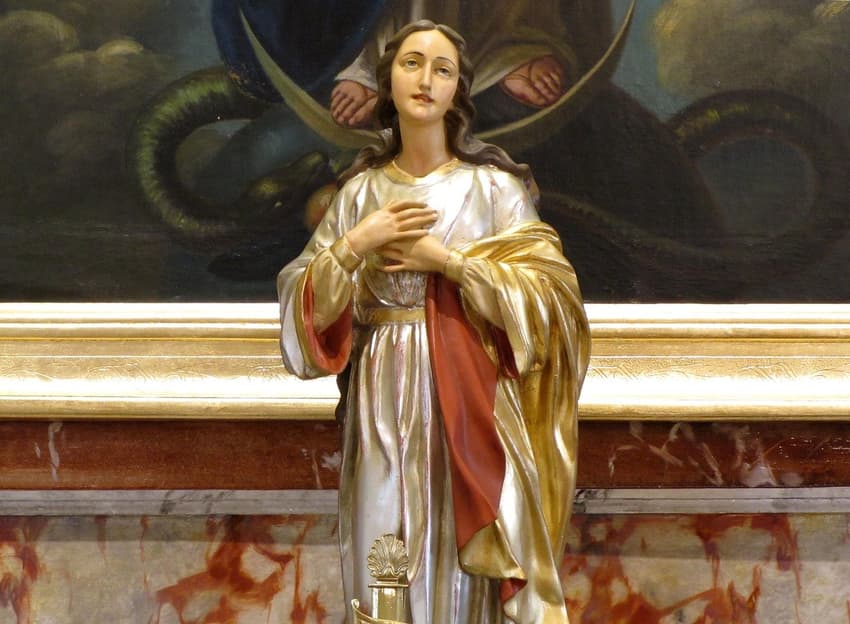Why is Friday December 8th a public holiday in Austria?

The next national public holiday in Austria is Friday December 8th. But not many other countries in Europe have this as a day off so why does Austria?
Mariä Empfängnis, or the Feast of the Immaculate Conception, observed on December 8th, is a public holiday in Austria, unlike in neighbours Germany.
Most businesses and government offices will be closed on this day, and public transport will run to differing timetables. Workers will get the day off.
Like many of Austria's public holidays, the origins lie in religion.
While Christmas, later in December, relates to the birth of Christ, the festival of Mariä Empfängnis relates to the supposed conception of Mary by her mother Anna, free of any sin. This has been a part of Catholic dogma since the middle ages, and is widely represented in art.
While the decision to consider Catholic festivals as public holidays is often decided by individual states, this particular festival is observed throughout the entire country for historical reasons.
At the close of the Thirty Year's War in 1647, Holy Roman Emperor Ferdinand III believed that it was only the intercession of the Virgin Mary that had saved Vienna - indeed, Austria and the rest of the Holy Roman Empire - from the Protestant armies that had caused so much devastation across Europe.
Ferdinand would know this, having played an actual role in the fighting. Therefore, observation of the festival was mandated across Austria.
Traces of this belief can be observed at the Mariensäule Am Hof, in Vienna’s city centre. Ferdinand had this column erected as an act of thanksgiving, and the inscription specifically references the Virgin Mary's supposed role in saving the city from beind destroyed, as so many others had been. While Mariä Empfängnis does not have as many traditions as are associated with other Catholic festivals, there are one or two worth noting.
First, it was the date agreed when the baking of Christmas cookies should begin. Second, in the 17th century, it was believed that failure to observe the holiday would result in a visitation by a ghostly woman, dressed in white - specifically not Maria!
We think we'll just stick with the cookies.
Comments
See Also
Mariä Empfängnis, or the Feast of the Immaculate Conception, observed on December 8th, is a public holiday in Austria, unlike in neighbours Germany.
Most businesses and government offices will be closed on this day, and public transport will run to differing timetables. Workers will get the day off.
Like many of Austria's public holidays, the origins lie in religion.
While Christmas, later in December, relates to the birth of Christ, the festival of Mariä Empfängnis relates to the supposed conception of Mary by her mother Anna, free of any sin. This has been a part of Catholic dogma since the middle ages, and is widely represented in art.
While the decision to consider Catholic festivals as public holidays is often decided by individual states, this particular festival is observed throughout the entire country for historical reasons.
At the close of the Thirty Year's War in 1647, Holy Roman Emperor Ferdinand III believed that it was only the intercession of the Virgin Mary that had saved Vienna - indeed, Austria and the rest of the Holy Roman Empire - from the Protestant armies that had caused so much devastation across Europe.
Ferdinand would know this, having played an actual role in the fighting. Therefore, observation of the festival was mandated across Austria.
Traces of this belief can be observed at the Mariensäule Am Hof, in Vienna’s city centre. Ferdinand had this column erected as an act of thanksgiving, and the inscription specifically references the Virgin Mary's supposed role in saving the city from beind destroyed, as so many others had been. While Mariä Empfängnis does not have as many traditions as are associated with other Catholic festivals, there are one or two worth noting.
First, it was the date agreed when the baking of Christmas cookies should begin. Second, in the 17th century, it was believed that failure to observe the holiday would result in a visitation by a ghostly woman, dressed in white - specifically not Maria!
We think we'll just stick with the cookies.
Join the conversation in our comments section below. Share your own views and experience and if you have a question or suggestion for our journalists then email us at [email protected].
Please keep comments civil, constructive and on topic – and make sure to read our terms of use before getting involved.
Please log in here to leave a comment.